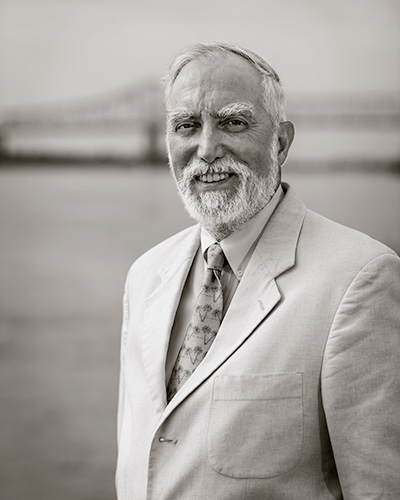"I want to do something useful": CC&E's R. Eugene Turner Receives Lifetime Achievement Award
November 09, 2023

Dr. R. Eugene Turner
BATON ROUGE - When wetland scientist and biological oceanographer R. Eugene Turner describes his current drive as a scientist, he says “I want to do something useful. I want to try and help in some way.”
It’s a drive that has marked much of his long career as a faculty member, and now emeritus, in the Department of Oceanography & Coastal Sciences. That career is now being honored this week, as Turner is awarded the Odum Lifetime Achievement Award at the Coastal Estuarine Research Federation, or CERF, Conference, in Portland, Oregon.
CERF gives the award for a record of sustained accomplishments of important contributions to understanding of estuaries and coastal ecosystems. This year’s selection of Turner, who has published over 250 articles, 40 of them in CERF publications, was unanimous. Turner noted that it was especially meaningful because he knew and worked with the Odum family, for whom the award is named.
“We are delighted that Dr. Turner has received this distinguished honor recognizing his dedication to advancing knowledge of estuaries and coastal ecosystems,” said Clint Willson, Interim Dean of the College of the Coast & Environment. “With more than 35,000 citations, his research has been shared nationally and internationally with those who study, manage, and wisely use resources to understand and sustain the coastal environment. As importantly, this award also recognizes Dr. Turner’s significant contributions to countless students and our coastal communities.”
“I have collaborated with Gene for over 30 years and know his work very well, and this Lifetime Achievement Award speaks to the depth and breadth of his accomplishments,” said Dubravko Justić, Texaco Distinguished Professor in DOCS. “His contributions to the fields of biological oceanography, estuarine ecology and wetlands research have had an immeasurable impact on the work being done in those areas. His commitment as a teacher and his professional service to the academic community have also served, and will continue to serve, as inspiration to the next generation of scientists as they advance understanding and work to conserve and sustain coastal and estuarine environments.”
Turner initially trained as a systems ecologist. This has reflected throughout his career as his work has repeatedly drawn on his desire to see a bigger picture in things. “I look at how the pieces fit together in a system,” he said.
This viewpoint contributed to his interest in the complex systems that are wetlands and coastal areas, which in turn brought him to LSU as a young scientist. “I looked at a map and the capitol was here. The major river in the US was here. And I thought that’s a big area. There must be something useful to do there.”
The holistic, systems approach has remained with him throughout his career. He has “crawled up the watershed” while investigating the causes of the dead zone in the Gulf of Mexico, for example, and examined water quality up and down the Mississippi. “The watershed rules the stream,” he notes. His research in watersheds and coastal wetland systems led to his naming as an LSU Boyd Professor in 2013. The title of Boyd Professor is the highest academic honor awarded by the university.
Giovanna McClenachan, now an assistant professor at Nicholls State University, remembered her time working with Turner. “One of the things I admire most about Gene is the way he encouraged me to think critically and connectively; to always consider how what we were studying tied into larger overlapping systems. This connective, big picture thinking is what has allowed Gene to have the far-reaching impacts he's had on the estuarine science field and is now core to my work as a coastal disturbance ecologist.”
Turner has also served as a founding member of the Wetland Working Group of the International Society for Ecologists, a working group that holds meetings every 4 years in locations around the world. He is also active as a member of LSU’s Center for Collaborative Knowledge.
Turner continues to work on projects he sees as having an impact. Currently, he is working with Native American tribes in coastal Louisiana as part of a grant from the Lowlander Center, helping them backfill abandoned canals dredged for oil and gas extraction. The canals and the spoil banks contribute to coastal wetland loss and restoring the hydrology will help significantly.
“I’ve been interested in what causes wetland loss and how to restore wetlands throughout the world throughout my career,” he said, “And this is right in my backyard.”